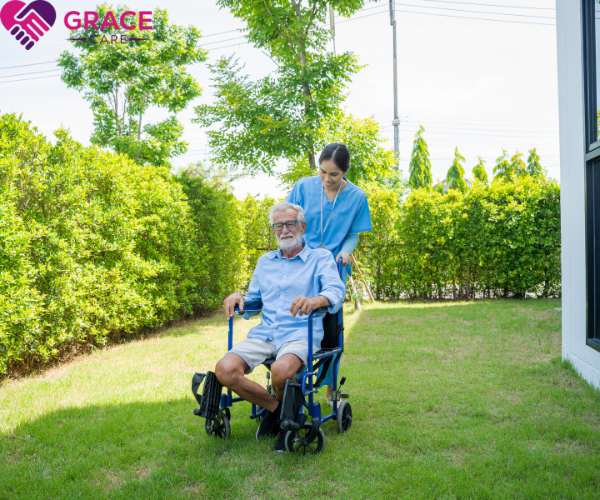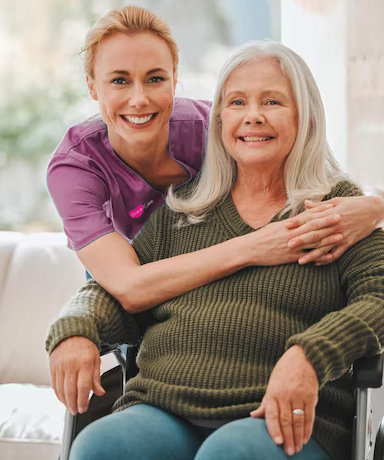It is important to note that there are several facets of caring for a patient at home that will provide different levels of support. Depending on the kind of help that you require, there is a need to understand the distinctions between types of home care: medical, friendship, help with certain activities of daily living, and so on. Adequately matching the type of care to the patient helps to better the patient’s overall experience by giving them the right care without compromising their dignity.
Essential Care and General Home Care are some outlined forms of home care, among several others. Although both aid in providing elderly support services within the house, they are specialized in dealing with different kinds of issues for people. This write-up will address the primary features of these forms of care so that you may select the best form based on your family member’s needs.
What kind of care is essential care?
Essential care is directed at people who are in need of more qualified professionals than a general home care service can provide and are in need of such help. For example, people who are undergoing recovery from surgeries or are bedridden due to chronic illness or require care within a hospital. Nurses or other specially trained staff usually offer this type of treatment.
Essential Care—Core Services
Personal Care:
These are services that help one carry out the basic everyday tasks such as feeding, bathing, dressing, grooming, and even going to the toilet. Such services are aimed at individuals who require assistance with moving around the house or performing simple tasks because of their age, any lingering illness, or injury of sorts.
Medical Support:
Essential Care consists of curative support services such as medication assistance, giving injections, tracking body stats, and helping with care after surgery. Such a care level is exceptionally designed for those who have medical ailments that require repeat visits to the practitioner or those who are recovering from surgery.
Skilled Nursing Care:
Nursing procedures done by licensed nurses, such as dressing a wound, administering IV therapy, and any other forms of treatment that require a high skill. For patients with multiple comorbidities, skilled nursing care is a necessity, particularly when there is a need for supervision from a professional nurse.
Target Audience for Essential Care
Essential care is designed for those patients who need to recover from surgeries and those who have chronic illnesses or other medical conditions with higher complexities. They may be older adults, disabled individuals, or patients who require clinical nursing or medical assistance at their homes.
Examples of Scenarios Where Essential Care is Needed:
- An aged person in the process of healing after having hip replacement surgery.
- A diabetic patient requiring assistance with managing insulin and blood sugar levels.
- A person who has been diagnosed with a heart condition and who requires constant monitoring of their vital signs and medication can be treated by a nurse and have medication administered to them.
- A person who is recovering after receiving cancer treatment and requires expert wound care as well as therapy during the recovery process.
What Exactly Is General Home Care?
General Home Care is designed to offer a patient assistance in completing day-to-day activities, someone to talk to, and to make sure that their home is safe, all the while not offering medical treatment. This type of care has an emphasis on enhancing one’s quality of life and augmenting their capability of living independently without the need for individualized and advanced medical care.
General Home Medical Services Preventive Patient Care Is Internationally Available Worldwide Service Portfolios Include the Following Ones.
Companionship: Companionship Is Not Medical Care, So in This Facility of Patient Care, Communication and Conversation Are Offered.
A significant aspect of general home care is the interaction that the caregiver and the patient share, which assists the caregiver emotionally by reducing feelings of loneliness. Activities can range from socialization and games to simple talking with the patient with the intention of improving their emotional well-being.
Light Housekeeping:
General home care encompasses assistance with household chores such as light cleaning, ironing clothes, preparing meals, and organizing kitchens. This might be beneficial for people who find it hard to keep up with household chores in a hygienic setting.
Assistance with Daily Activities:
Caregivers aid in mobility, meal planning, and other activities as needed to help patients maintain independence. This includes getting a client or patient in and out of bed, helping them walk, or ensuring their safety during movements.
Target Audience for General Home Care
General home care caters to the needs of such individuals that do not suffer from any serious medical condition but require assistance in basic day-to-day tasks. This service is frequently offered to senior citizens whose basic aim is to stay self-sufficient or those who require aid for a limited time period so that they can live in their places of residence.
Examples of Scenarios Where General Home Care is Needed
- An elderly individual is in need of help with undertaking several small tasks such as preparing meals, dusting and washing utensils, and personal appointment management.
- Someone who is slightly disabled and has mobility issues and therefore needs help fetching things in the house but not booking a health assistant.
- A companion who is in a lesser dementia stage and would require support in performing routine tasks or a partner for plus.
- A care recipient whose family allowed them to take a break from caregiving responsibilities.
- And a few more of similar nature.
Differences of Note Between Minimized Care and General Home Care
Level of Care
And A Long Time For The Better Half

Essential Care vs. General Home Care
General care includes an encourager whose urge to provide a professional service is unrelated to making money, and for the general part, seeking business opportunities. Such as a person who promotes people from assisting and caring for the elderly, sick, or disabled from their own homes with the intention of turning it into a profession and receiving monetary rewards for it.
In contrast to unskilled care services, skilled care is tailor-made for registered nurses and therapists that provide medical interventions and monitor the client’s health. At the same time, activities that do not fall within the professional realm can be overseen by unskilled caregivers, including companions and aides who help with home health equipment. In other words, they are able to assist with daily chores.
With this in mind, who are the services actually intended for?
Essential care addresses the precise requirements of elderly, ill, or recovering individuals. It is designed specifically for a person that has multifaceted medical conditions or someone recovering from their surgery or spending a lot of time in hospitals. It is essential for providing someone with professional healthcare services or specialized medical care.
General home care, on the other hand, caters to individuals that accomplish non-medical mundane chores and require social engagement and interaction and a clean, organized living space. This type of care is particularly well-suited for individuals that are still independent and need some additional help.
Then we have cost considerations that include:
The price determinants for each of the care types: what exactly intertwines with them?
In most cases, due to the exceptional level of care required in essential care, the cost tends to be on the higher end of the spectrum. The complex skills required, the number of visits needed, and specific health requirements define pricing in the case of essential care.
Non-medical duties are a part of a non-medical home assistant’s work, which makes it more cost-effective. The expenses are generally determined by the number of hours, rather than how complex the attention required is.
Insurance Coverage and Payment Options:
Those paying through Medicare may be able to get back some or all of the funds used for starting care; this tends to apply to individuals that are recovering from surgery or have a chronic illness.
Medical insurance on General home care is usually absent unless someone has a specific medical condition. Some other long-term insurances may come in handy in this case. It is usually wise and necessary to ask the insurance company to provide this type of information in advance.
FAQs:
What is the cost difference between essential care and general home care?
Since the essential types include the medical aspects, they generally would be charged more compared to home care, which doesn’t focus on medical aspects, and those details are markedly more affordable.
Can essential care services be provided at home?
Yes, medication, skilled nursing, and therapy are a few of the essential care services that can be done in the home setting.
Is general home care appropriate for a patient in recovery from a surgery?
According to their needs, someone who needs basic care might utilize general home care for basic assistance, seeing as it is appropriate for such an individual.
Who are considered caregivers in essential care?
Essential care is provided by professional caregivers that include registered nurses or any licensed personnel, as they are qualified and trained to carry out and perform health-related tasks and procedures.
Is it possible to get help financially for home care services?
Looking into certain regulatory bodies can help out by finding if the insurance covers any of the services needed, alongside checking if long-term care insurances or even Medicare will pay out.
Conclusion
Analyzing your loved one’s need allows you to determine the type of care they require, whether they need essential or general home care, as it ensures that you know the correct level of attention and support they need, for example, someone who needs skilled nursing care.
Engaging a home care service can definitely assist you in making a better decision and devising a custom care plan that fits your loved one’s requirements.






